The country, which holds immense geostrategic significance for India, is in a highly volatile state and the upcoming polls are being viewed as a veritable semi-final before its presidential elections.
In this exclusive conversation with Rediff.com contributor Rajeev Sharma, exiled Opposition leader Ahmed Naseem explains why the world should care about democracy in Maldives.
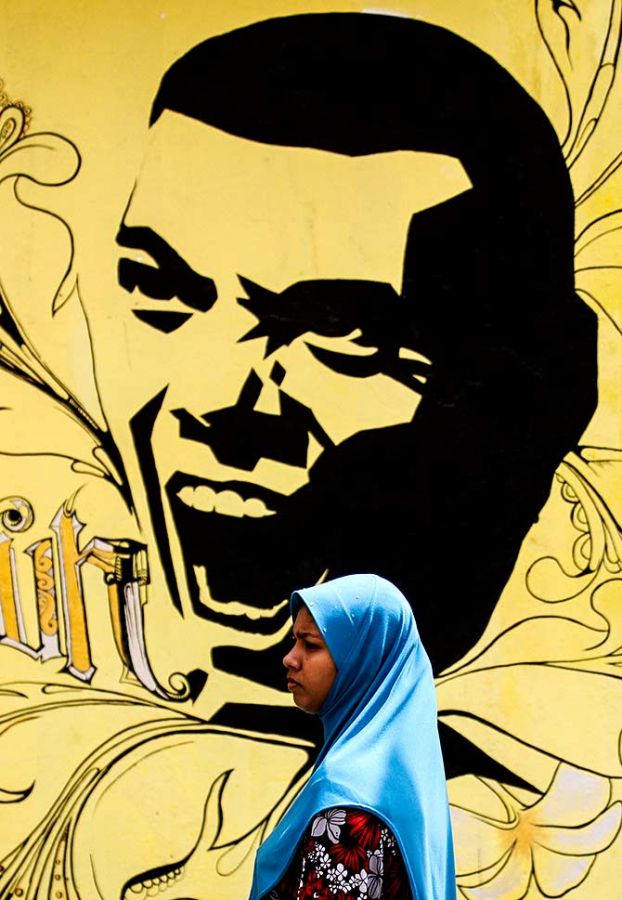
He has been living in exile in the UK since 2016.
Photograph: Dinuka Liyanawatte/Reuters
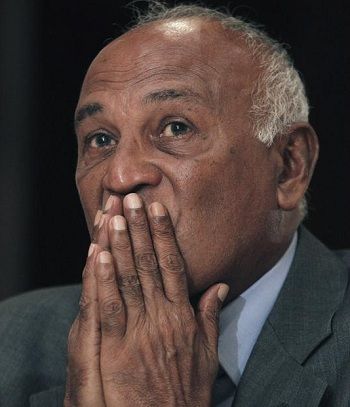 Even as the domestic politics of the Maldives goes through a tailspin, this strategically important SAARC country is scheduled to hold local council elections soon.
Even as the domestic politics of the Maldives goes through a tailspin, this strategically important SAARC country is scheduled to hold local council elections soon.
Not much is known about these elections, but given the volatile state the Maldivian polity is currently in, the polls are being viewed as a semi-final before the archipelago nation's presidential elections next year.
Former Maldives foreign minister Ahmed Naseem, left -- a senior leader of the Opposition Maldives Democratic Party and close aide of former president Mohammed Nasheed -- tells the world about the significance of the upcoming local elections.
The first of a two-part interview from Colombo, where Naseem has been living in exile for two years:
Now that former president Nasheed has left Colombo for the UK, where he has been living for quite some time, what have he, you and other party colleagues decided about the roadmap for the MDP?
In February 2017, the MDP elected reputable lawyer and former minister Hassan Latheef as the new chairperson.
The MDP's previous chairperson, Ali Waheed, has had to be in exile due to terrorism charges framed against him.
He resigned some months ago stating his intention to allow someone without pending charges and living in Malé to get elected to the post.
The new chairperson will work to strengthen the structure and make more efficient the party's administration, convening regular meetings of its national council as well as committees and pave the way for a scheduled party congress.
Right now, the party's elections committee is active in campaigning nation-wide for upcoming local council elections.
The party's upcoming congress will facilitate fresh internal elections, leading up to primaries, especially in readiness for the 2018 presidential elections.
Given former President Nasheed's unfading popularity, all indications are that he will win the presidential primary.
In the meantime the party's parliamentary group will cooperate fully with our new partners in the House to replace the speaker, the deputy speaker, amend unpopular laws, including the law on foreign ownership of land, the law specifying age limits on presidential contenders and others that would pave the way for free, fair, transparent, credible and inclusive elections.
The Maldivian local council polls have already been deferred thrice. Do you think these elections will be held at all?
The local council polls, after being deferred thrice, are now scheduled for May 6.
The poll date was unduly set back thrice simply because the ruling party, the PPM (Progressive Party of Maldives), mired in the midst of its split into two factions, had not been able to identify candidates, and, therefore, had not been campaigning comparatively as much as the Opposition.
The present schedule of May 6 falls three weeks prior to the fasting month of Ramazan.
My sources in Malé say that the local council elections may be further delayed until after Ramzan, (after June 24) to facilitate as many undue and unlawful arrangements as possible to foresee being able to fix the results.
What kind of participation are you expecting in these local council elections?
Over 1,487 candidates have applied to contest, including 1,124 candidates from political parties and 363 independent candidates.
563 councillors will be elected to 179 island councils, 67 councillors to 18 atoll councils, and 23 councillors to three city councils.
You are pinning a lot of hope on these elections. How are these elections important?
The local council elections are important as previous to the 2008 constitution, only nominees appointed by the executive were chiefs of administration in the atolls and islands.
The local councils are a feature of the decentralisation act passed in parliament in April 2010.
This act formalised the roles and responsibilities of atoll and island councils and required that councillors be democratically elected.
The atoll and island councils were tasked with taking over public health services, basic municipal services, contribute to land use plans and facilitate community-based institutions.
Local council elections are also important as decentralisation and local governance were key pledges of the MDP.
Since the first democratically elected government under the 2008 constitution was ousted in 2012, the coup regime and the regime that the coup paved the way for have exerted concerted efforts to nullify key provisions in the decentralisation act.
The government continues to serially abrogate powers of the city, atoll and island councils and had effected unlawful amendments to laws to reduce previous councils averaging 5 members to just 3.
Decentralisation of administration, power and decision making is a central feature for good governance.
Decentralisation facilitates democratic governance from among the people instead of centralised rule from the executive in the capital island of Malé.
Elected members to local councils will, in turn, be better positioned to assist a party's regional and parliamentary candidates, as well as presidential candidates.
If these elections are held, how do you rate the Opposition's chances? What if you lose these polls?
As the Opposition, and especially the MDP, have kept up scheduled team visits to various constituencies to campaign for their candidates, the MDP expects to win a higher majority of council seats than the previous local council elections of 2014.
In the local council elections of 2014, the MDP won 42 per cent against 26 percent won by the PPM.
Present forecasts estimate that the MDP is favoured to win 60 per cent of council seats nationwide, with majorities in many islands, including the three cities of Malé, Addu and Fua Mulak.
You have said that the combined Opposition now enjoys a majority in the Majlis, the Maldivian parliament. How are your party's new allies going to weather the political storm?
Our allies will primarily work in solidarity in parliament.
MPs of the MDP (21), Jumhooree Party (8), MPs supporting former president Maumoon Abdul Gayoom (9 and growing), the one MP of Adhaalath Party, independent MPs and pledged crossovers now constitute a majority in parliament. (In a House of 85 MPs, with one MP in jail, and speaker/deputy not included in voting).
Members of the new Opposition parliamentary group have drawn up a list of necessary legislation that will reverse unconstitutional amendments, and to effect amendments to the law on foreign ownership of land, the law specifying age limits on presidential contenders and others that would pave the way for free, fair, transparent, credible and inclusive elections.
The MPs will also call on constituencies to petition their respective MPs to support the Opposition's alliance working to make government accountable to the House and the people.
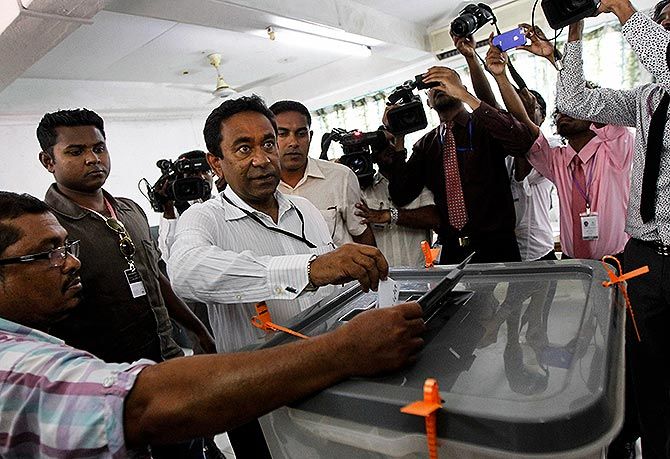
Cynics may say that all that your party has tried so far in the Maldives is to conjure up a storm in a tea cup...
Should the storm refer to events on the ground, the Opposition has survived through structural strength and seeks remedies to controversies instigated by President Abdulla Yaameen Abdul Gayoom.
In other words, we are not the creators or authors of the so-called storm.
The systematic undermining of the constitution; steamrolling unlawful amendments in parliament; the sackings of two vice-presidents, the elections commissioner, the auditor general and the chief justice; un-responded allegations of international crimes and money laundering; the jailing of three former ministers of defence; the MMPRC corruption; the jailing of virtually all Opposition political leaders, forcing scores of politicians into exile were all done by President Yameen, despite the fact that President Nasheed had graciously accepted the results of the 2013 elections, thus unreservedly accepting an Opposition tenure of five years.
Isn't there a remedy to all these travails in the Maldivian constitution or is your statute silent on such issues?
The Maldives constitution of 2008 enshrined many democratic rights and principles that previous constitutions did not describe.
Prior to the 2008 constitution, the Maldives was a single party State where the executive was in charge of the civil service, the security forces, the judiciary and had control over parliament through a 'constitutionally appointed' group of MPs.
The rights of assembly, freedom of speech, and other basic human rights and concepts such as transparency, inclusiveness or even civil society were not postulated or described in previous constitutions.
After the ousting in 2012 of the democratic government elected under the 2008 constitution, the coup regime together with the regime for which it paved the way, the Yaameen administration, has exerted concerted actions to reverse democratic gains and to establish the impunity and influences that pre-2008 constitutions had facilitated for decades.
But where was your party and its allies when your country's constitution was being subverted, as you seem to be alleging?
Should vocal and visible opposition (when earlier there were no opportunities to do so) to these reversals and regress seem exaggerations, it may be that those who had been taking those rights for granted for a considerable time are lulled by the very conditions they've long enjoyed in their respective democratic countries.
(It may have) led (them) on to wrongly get prejudiced and expect the existence of the same rights for us.
Your party and allies have talked big, but yielded little on the ground. President Yameen continues to rule the Maldives with an iron hand. What is the reason for your failure and his success?
Intimidation and unlawful actions; through a combination of a group of co-opted MPs, sections of the judiciary and the police.
In the vote of no-confidence against parliament Speaker Abdullah Maseeh held on March 27, 2017, the House majority leader proposed a roll call vote.
Deputy Speaker Moosa Manik, who chaired the proceedings, unlawfully asked for a vote as House rules only allow a roll call vote when the electronic system was proven to have failed.
It was only after the security forces had evicted 13 Opposition members and other Opposition MPs walked out that the deputy speaker announced a majority (of 48 votes for and none against), based on a dubious count of small pieces of paper held up by respective MPs.
The expected defection of ruling party lawmakers was contingent on electronic voting, which would have allowed them to see how other MPs voted and decide based on the way the vote was going.
But what about your allies? How do you explain the subjugation of the entire Opposition?
The biggest weapon used against political rivals by President Yameen is the framing and execution of fabricated criminal charges against Opposition figures.
These are done through coercion of partisan elements in the judiciary and politicised appointees in independent institutions such as the police.
President Yameen has systematically 'colonised' independent institutions with cronies and appointees from his (now defunct) political party, the Peoples' Alliance.
I am referring to the entire Opposition. You mean your allies too were as helpless as the MDP?
Immediately after the new Opposition alliance was announced on March 24, 2017, the police began summoning leaders of the Jumhooree Party, including the party's leader Gasim Ibrahim, the party's parliamentary deputy and former police commissioner Abdulla Riyaz, former president Maumoon Abdul Gayoom's son and PPM MP Farish Maumoon on spurious charges.
Penitentiary officers had taken former defence minister Colonel Mohamed Nazim (retd), who was under house arrest, back to jail without prior notice, and announced the curbing of statutory privileges for MP Ahmed Mahloof, who had voiced support for the new Opposition alliance from jail.
All these leaders have pledged to stand fast against the government in 'defending the constitution' despite these obvious attempts at intimidation.
Rajeev Sharma, independent journalist and strategic analyst, tweets @Kishkindha







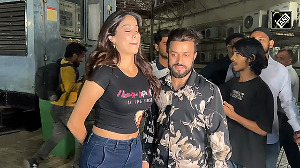
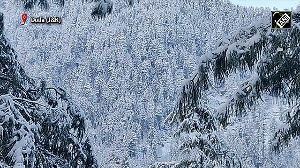
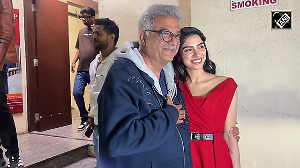
 © 2025
© 2025